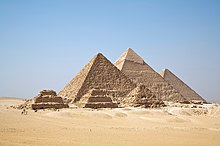Our website is made possible by displaying online advertisements to our visitors.
Please consider supporting us by disabling your ad blocker.
Circassians in Egypt
Мысырым ис Адыгэхэр الشركس في مصر | |
|---|---|
 Pyramids in Giza, Egypt. Some Circassians live in Giza. | |
| Regions with significant populations | |
| Alexandria, Cairo, Giza, Port Said, Sharqia Governorate | |
| Languages | |
| |
| Religion | |
| Sunni Islam |
| Part of a series on the |
| Circassians Адыгэхэр |
|---|
 List of notable Circassians Circassian genocide |
| Circassian diaspora |
| Circassian tribes |
|
Surviving Destroyed or barely existing |
| Religion |
|
Religion in Circassia |
| Languages and dialects |
|
| History |
|
Show |
| Culture |
The Circassians in Egypt (Adyghe: Мысырым ис Адыгэхэр, romanized: Mısırım yis Adıgəxər; Arabic: الشركس في مصر) are people of Egypt with Circassian origin. For centuries, Circassians have been part of the ruling elite in Egypt, having served in high military, political and social positions.[1] The Circassian presence in Egypt traces back to 1297 when Lajin became Sultan of Mamluk Sultanate of Egypt. Under the Burji dynasty, Egypt was ruled by twenty one Circassian sultans from 1382 to 1517.[2][3][4] Even after the abolishment of the Mamluk Sultanate, Circassians continued to form much of the administrative class in Egypt Eyalet of Ottoman Empire, Khedivate of Egypt, Sultanate of Egypt and Kingdom of Egypt.[1] Following the Revolution of 1952, their political impact has been relatively decreased.
With the lack of censuses based on ethnicity, population estimates vary significantly.[5]
Mainly of mixed Circassian Abazin origin, the House of Abaza is the largest aristocratic family and the largest extended family in the country. It retained cultural and political clout to current times.[6][7][8][9]
- ^ a b Lewis, Martin W. The Circassian Mystique and its Historical Roots. Retrieved 18 May 2015.
- ^ McGregor, Andrew James (2006). A Military History of Modern Egypt: From the Ottoman Conquest to the Ramadan War. Greenwood Publishing Group. p. 15. ISBN 9780275986018.
By the late fourteenth century Circassians from the north Caucasus region had become the majority in the Mamluk ranks.
- ^ Massoud, Sami G. (2007). The Chronicles and Annalistic Sources of the Early Mamluk Circassian Period. Leiden: Brill Publishers.
- ^ Natho, Kadir I. (2009). Circassian History. Xlibris Corporation.
- ^ Messieh, Nancy (2014-06-26). "Egypt's Minorities Remain Ostracized". Atlantic Council. Retrieved 2024-04-02.
- ^ "Rushdi Abaza, AlexCinema". www.bibalex.org. Retrieved 18 May 2015.
- ^ Afaf Lutfi Sayyid-Marsot, Egypt in the reign of Muhammad Ali Pasha, pp. 123–124.
- ^ Yunan Labib Rizk, The making of a king Archived 2008-08-14 at the Wayback Machine, Al-Ahram Weekly, 762, 29 September – 5 October 2005.
- ^ Goldschmidt, Jr., Arthur (2000). Biographical Dictionary of Modern Egypt. Lynne Rienner Publishers. p. 1. ISBN 978-1-55587-229-8. Retrieved 18 May 2015.
Previous Page Next Page


